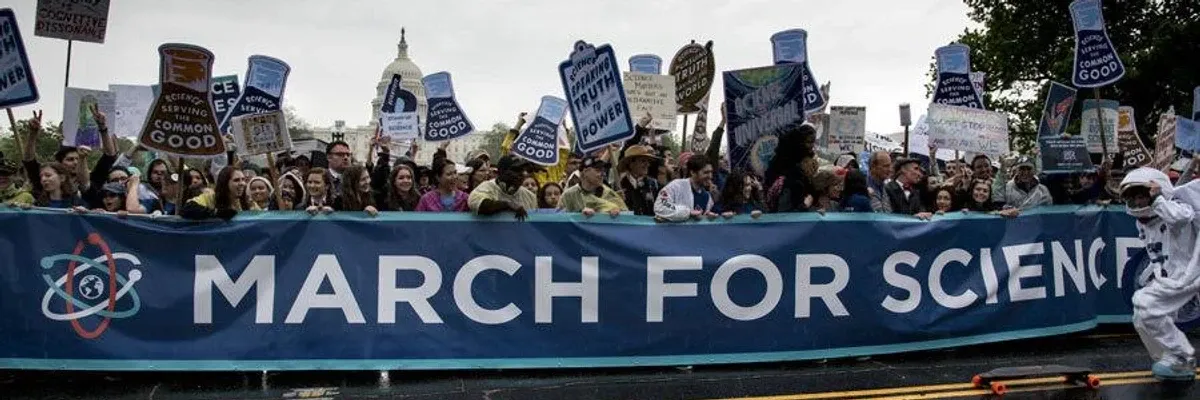Following the tumultuous Trump years when scientific fact and fiction often clashed, President Joe Biden resolved to strengthen federal protections against suppression or alteration of government science. Just days after his inauguration, he issued an all-agency directive to bolster the scientific integrity policies that had proven so useless in stemming the abuses of Trump and his appointees.
This effort was launched under the hopeful banner of “Restoring Trust in Government Through Scientific Integrity.” Now, months behind schedule, the first revamped scientific integrity policy crafted under this initiative is rolling out. Unfortunately, it leaves a lot to be desired.
If finalized, this revised policy would cover thousands of scientists and technical analysts working within the behemoth $1.7 trillion Department of Health & Human Services (HHS), which spans a dozen divisions and includes nine separate public health agencies, such as the National Institutes of Health (NIH), Centers for Disease Control & Prevention, and Food & Drug Administration.
It will also likely serve as the template for new policies that are supposed to be adopted in all other federal agencies doing scientific work. Distressingly, among other shortcomings, this draft policy:
- Fails to prevent political interference with no provision for independent investigation of allegations of misconduct or sanctions for meddling by political appointees;
- Lacks any meaningful legal protections for scientists doing controversial work that may conflict with an agency’s political agenda;
- Contains few safeguards against scientific work being altered or suppressed, such as defined clearance procedures for approving technical publications or presentations;
- Does not apply to grantees and, in agencies such as the NIH, much of the scientific work is done under grants; and
Under this proposed policy, every aspect of enforcing scientific integrity principles would remain a captive of the political process inside the agencies. Thus, it is difficult to see what about this policy would prevent a return to the reign of “alternative facts” should Trump be reelected. Moreover, in the unlikely event that it did prove restrictive, a reelected Trump could simply rescind it, just as he did so many other Obama-era policies.
One core problem was the White House “framework” for this policy, issued earlier this year. Ths framework was composed largely by the same agency scientific integrity officers who presided over the Obama-era policies which had proven so ineffectual under Trump.
As a result, the organizing principle behind both the HHS draft and the White House framework appears to be bureaucratic self-protection. That explains the lack of transparency pervasive throughout the draft HHS policy which, tellingly, stipulates that “all descriptions of investigations and appeals will be anonymized.”
How is public trust in the credibility of government science supposed to be enhanced by closed-door investigations overseen by officials named by political appointees and reported to the public only in “anonymized” versions?
Perhaps one reason for these disappointing results is that it was overseen by the White House Office of Science & Technology Policy. Before the work had barely begun, the OSTP Director was forced to resign for bullying his staff. That left the reins for this project of an OSTP Deputy Director who last year was sanctioned by the National Academy of Sciences for misconduct and barred from participating in its publications and activities for five years.
Consequently, agencies were allowed to write scientific integrity rules in the most self-serving fashion possible. This, in turn, means that agencies will invoke scientific integrity principles only when it is politically convenient—an arrangement that defeats the entire purpose of this elaborate scientific integrity policy formulation effort.
Preventing this unfolding implosion propelled by institutional self-interest will require that the Biden brain trust radically change course. Rather than pursuing this murky agency-by-agency approach, the White House should impose government-wide rules that would:
- Create uniform interagency review and appeal processes for scientific misconduct allegations, such that individual agencies can no longer control investigations and sequester the results.
- Set uniform penalties for scientific integrity violations and require that political appointees found responsible for violations be publicly identified.
- Establish uniform clearance policies so that scientific material cannot be withheld from publication for other than technical reasons with enforceable appeal procedures to prevent research papers from being held in extended limbo.
There is no plausible reason why scientists in different agencies should be treated differently or have different rights. These government-wide rules would not only drive significant change but would also surmount the bureaucratic strategies where ground-breaking science is often strangled. Further, it may encourage Congress to codify these safeguards so that they may not be wiped summarily wiped out by a succeeding president.
Simply put, restoring trust in government science requires the ability of the public to verify that its trust is merited.

